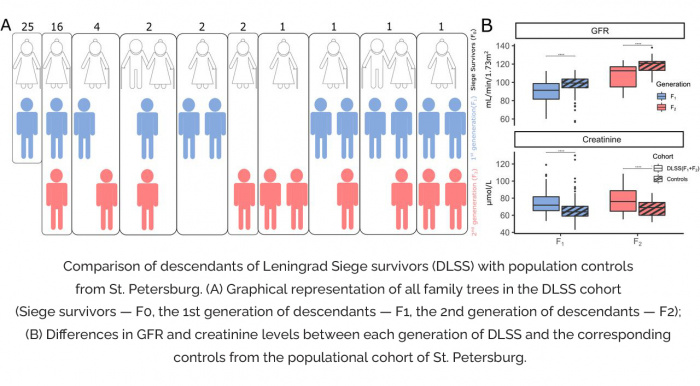
Transgenerational effect of early childhood famine exposure in the cohort of Leningrad siege survivors’ offspring
Specialists of the Population Genetics Research Laboratory of the WCRC for Personalized Medicine obtained the first results from the study comparing health of children and grandchildren of Leningrad siege survivors.
In recent decades, much research has focused on the theory of fetal programming of disease predisposition. The phenomenon of fetal programming suggests that environmental exposures (stress, malnutrition, air pollution) and certain behavioral habits of the mother (smoking, alcohol abuse, poor nutrition or overeating) during pregnancy lead to delayed consequences and the development of diseases in adulthood. Further study showed that some consequences of fetal programming can be transmitted to new generations, which can have both positive and adverse effects. Such adaptive effects are called transgenerational.
Malnutrition or starvation during pregnancy and early childhood is one of the most important risk factors for long-term cardiometabolic disorders (diabetes mellitus, obesity, hypertension) in adulthood. The Siege of Leningrad was another tragic example of catastrophic malnutrition of the city’s residents having experienced a major supply deficit for two and a half years during the Second World War (September 1941 – January 1943). Since 2008, scientists have been studying the health effects of the besieged Leningrad residents, and since 2020, specialists of the Population Genetics Research Laboratory have been studying their descendants. Researchers had a unique opportunity to investigate the long-term association of parental starvation in the perinatal period and the period of early childhood with the cardiometabolic changes observed across generations of their descendants. They examined both children and grandchildren of besieged Leningrad residents and performed laboratory and instrumental tests to assess the condition of the heart, blood vessels, kidneys, brain and collected information about their diseases, bad habits, socio-economic and psychological characteristics. The control group was represented by a random sample of St. Petersburg population whose ancestors did not survive the siege.
The first result revealed a decreased kidney function in the descendants of Leningrad siege survivors compared with controls. Additionally, independent of differences in kidney function, differences in the eating patterns were detected. Data on cardiometabolic and vascular transgenerational effects of famine exposure can be used to improve personalized prevention of cardiovascular disease in several generations and prevent the development of diseases.
Read more about the study here:
https://www.medrxiv.org/content/10.1101/2022.11.04.22281954v1.article-metrics
26.01.2023
